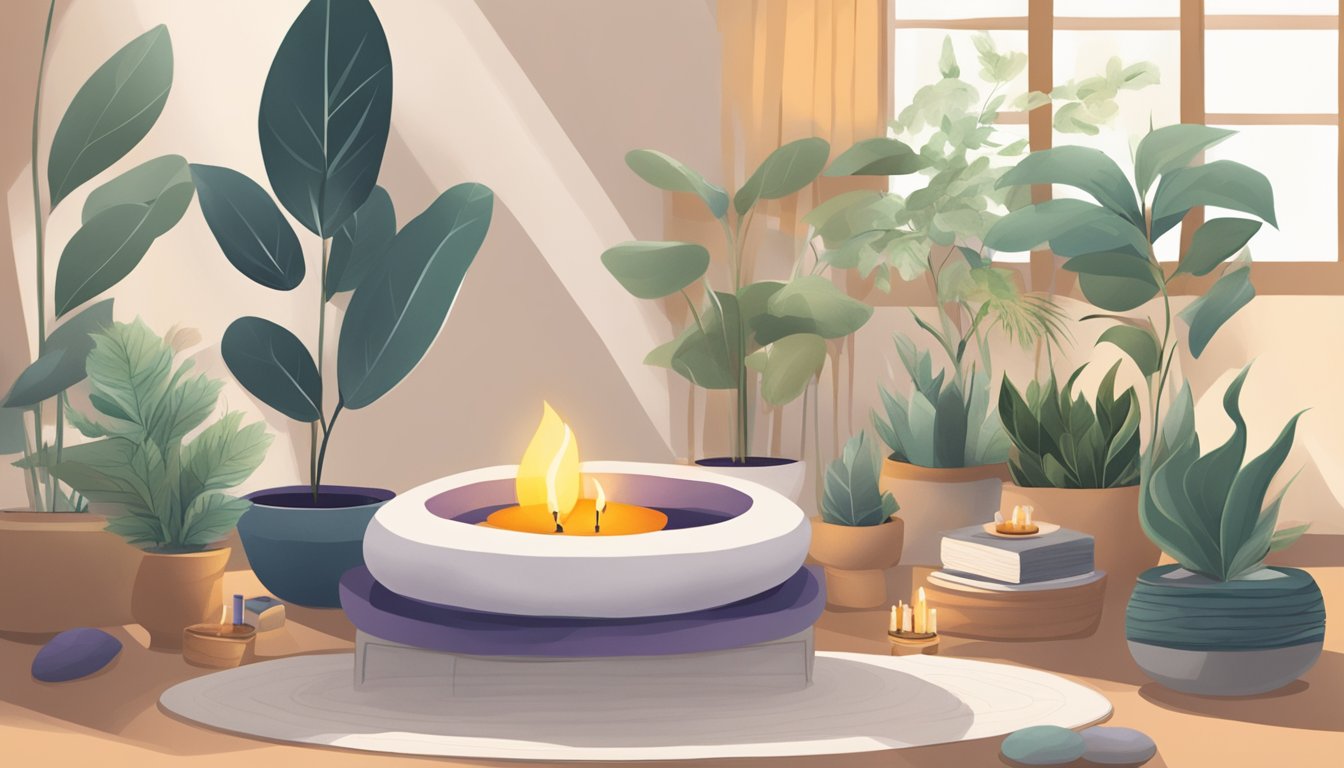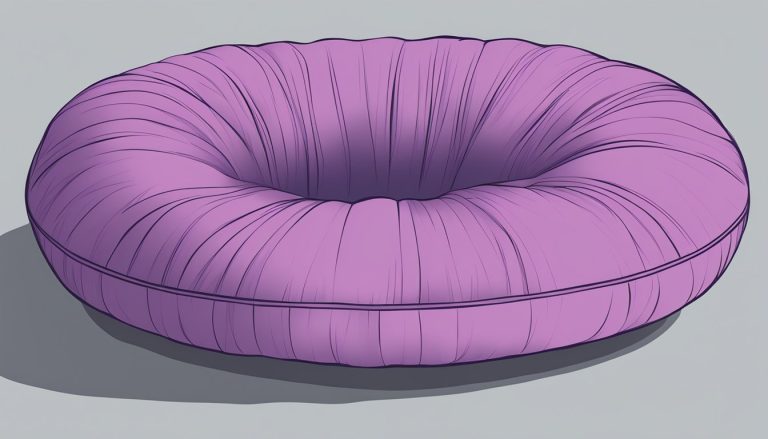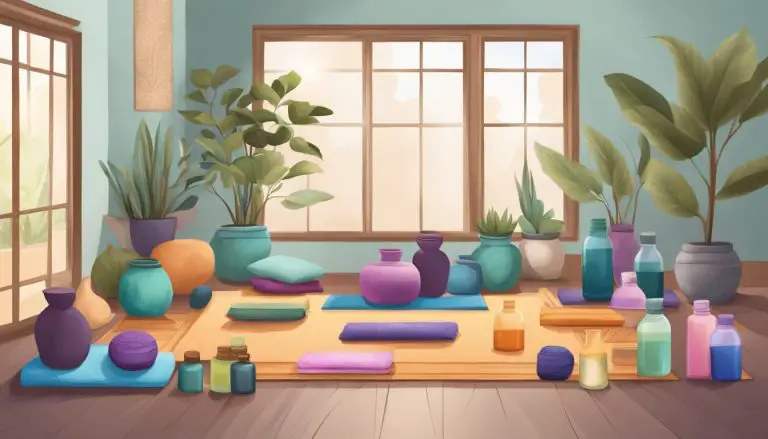What Products Can Help With Meditation Practice?
Meditation is a practice that has been around for centuries and has many benefits for mental and physical health. It is a way to calm the mind and body, reduce stress, and promote relaxation.
Many people find it difficult to meditate without any guidance or support, and that’s where meditation tools and accessories come in.

There are many products available that can help with meditation, such as meditation cushions, incense, and guided meditation apps. These products can help create a calming environment and provide support for those new to meditation or struggling to maintain a regular practice.
However, it’s important to note that these products are not necessary for meditation, and the most important thing is to find a practice that works for you.
In this article, I will explore some of the most popular meditation tools and accessories and how they can help with your practice. I will also provide tips on how to integrate them into your daily routine and how to choose the right products for your needs.
Key Takeaways
- Meditation tools and accessories can help create a calming environment and provide support for those new to meditation or struggling to maintain a regular practice.
- There are many products available, such as meditation cushions, incense, and guided meditation apps, but they are not necessary for meditation.
- It’s important to find a practice that works for you and to choose products that fit your needs and preferences.
Understanding Meditation

As someone who practices meditation, I find it to be an excellent tool for reducing stress and improving my overall well-being. Meditation is a simple practice of focusing your attention on a particular object, thought, or activity to achieve a mentally clear and emotionally calm state.
In this section, I will discuss the different types of meditation, the science behind meditation, and the benefits for mind and body.
Types of Meditation
There are various types of meditation, each with its unique approach and benefits. Some of the most common types of meditation are:
- Mindfulness Meditation: This type of meditation involves paying attention to the present moment without judgment. It’s an excellent way to reduce stress and anxiety and improve focus and concentration.
- Focused Meditation: In this type of meditation, you focus your attention on a particular object, such as a candle flame, your breath, or a mantra. It helps to improve concentration and reduce distractions.
- Mantra Meditation: This type of meditation involves repeating a word or phrase to help you focus your mind. It’s an excellent way to reduce stress and anxiety and improve your overall well-being.
- Transcendental Meditation: This type of meditation involves repeating a specific mantra to achieve a deep state of relaxation and inner peace.
- Movement Meditation: This type of meditation involves moving your body in a particular way, such as yoga or tai chi. It helps to improve flexibility, strength, and balance while reducing stress and anxiety.
The Science Behind Meditation
Meditation has been scientifically proven to have numerous benefits for both the mind and body. Studies show that regular meditation can reduce stress, anxiety, and depression, improve sleep quality, and lower blood pressure. It can also improve focus, concentration, and cognitive function.
Meditation works by activating the parasympathetic nervous system, which is responsible for the body’s rest and relaxation response. This helps to reduce the production of stress hormones, such as cortisol, and increase the production of feel-good hormones, such as serotonin and dopamine.
Benefits for Mind and Body
Regular meditation practice can have a significant impact on your mental and physical health. Some of the benefits of meditation include:
- Reducing stress and anxiety
- Improving sleep quality
- Lowering blood pressure
- Improving focus and concentration
- Boosting immune function
- Reducing symptoms of depression and anxiety disorders
- Increasing feelings of happiness and well-being
- Promoting spiritual enlightenment and self-awareness.
Meditation Techniques and Practices
Breathing Techniques
One of the simplest and most effective ways to start meditating is by focusing on your breath. Begin by sitting comfortably with your back straight and your eyes closed.
Take a deep breath in through your nose and then slowly exhale through your mouth. Repeat this process several times, focusing all your attention on your breath. This technique is known as deep breathing and can help you relax and clear your mind.
Another popular breathing technique is known as the 4-7-8 method. Inhale through your nose for 4 seconds, hold your breath for 7 seconds, and then exhale through your mouth for 8 seconds. This technique can help reduce stress and anxiety and promote relaxation.
Guided vs Unguided Meditation
Guided meditation involves listening to a teacher or a recording that guides you through the meditation process. This can be helpful for beginners who are just starting out and need some guidance.
Unguided meditation, on the other hand, involves meditating on your own without any external guidance. This can be more challenging but can also be more rewarding as you learn to trust your own inner guidance.
Meditation for Beginners
If you’re new to meditation, it’s important to start slowly and not expect too much too soon. Begin by meditating for just a few minutes each day and gradually increase the time as you become more comfortable.
It’s also important to find a quiet and comfortable place to meditate where you won’t be disturbed.
There are many resources available to help beginners get started with meditation, including meditation apps, books, and online courses. It’s important to find a method that resonates with you and to be patient with yourself as you learn and grow.
Meditation Tools and Accessories

As someone who practices meditation regularly, I know the importance of having the right tools and accessories to help me achieve a deeper state of relaxation. Here are some of my favourite meditation tools and accessories that I use to enhance my practice.
Cushions and Chairs
A comfortable cushion or chair can make all the difference when it comes to meditation. Sitting on a cushion or chair that supports your spine and allows you to sit up straight can help you maintain good posture and prevent discomfort during longer meditation sessions.
I recommend investing in a quality meditation cushion or chair that suits your individual needs and preferences.
Aromatherapy and Candles
Aromatherapy and candles can help create a calming and relaxing atmosphere for meditation. I love using essential oils like lavender in my diffuser or burning candles with soothing scents like sandalwood or vanilla.
Not only do these scents help me relax, but they also signal to my brain that it’s time to unwind and let go.
Meditation Apps and Tech
Meditation apps and tech can be a great way to enhance your meditation practice. There are a variety of apps available that offer guided meditations, calming music, and even breathing exercises.
I personally use the Calm app, which has a wide range of features to help me relax and focus.
Additionally, there are tech tools like audio and video recordings, Tibetan singing bowls, and eye pillows that can also help deepen your meditation practice.
Integrating Meditation into Daily Life
Meditation is a great way to reduce stress, improve focus, and promote relaxation. It’s a practice that can be done anywhere, anytime, and doesn’t require any special equipment. Here are some ways to integrate meditation into your daily life:
Meditation at Home
One of the easiest ways to meditate at home is to create a quiet, comfortable space where you can sit and relax.
You can use a meditation cushion or chair to sit on, or simply sit on the floor with your back straight and your legs crossed. You may want to use a meditation timer to help you keep track of time.
There are also many meditation apps available that offer guided meditations and music to help you get started.
Meditation at Work
If you’re feeling stressed at work, taking a few minutes to meditate can help you feel more relaxed and focused.
You can find a quiet space to meditate, or simply close your eyes and focus on your breath at your desk. There are also many meditation apps that offer short guided meditations that you can do during your lunch break or coffee break.
Meditation and Travel
Travelling can be stressful, but meditation can help you stay calm and relaxed.
You can meditate on a plane, train, or bus by closing your eyes and focusing on your breath. You can also use a meditation app or listen to a sleep story to help you relax and fall asleep on a long flight or train ride.
Advanced Meditation and Personal Growth
As I progressed in my meditation practice, I found myself seeking more advanced techniques to deepen my experience and gain a deeper understanding of myself and the world around me. Here are some ways I have found to advance my meditation practice and promote personal growth.
Deepening Your Practice
For experienced meditators looking to deepen their practice, guided meditations can be a valuable tool. These meditations can help you explore new techniques and approaches that you may not have considered before.
Additionally, meditation courses and retreats can provide a supportive environment to help you develop your skills and connect with other like-minded individuals.
One course that I found particularly helpful is the Healthy Minds Program, which offers a variety of resources and tools to help you cultivate a healthy mind and promote personal growth. The program is designed to help you develop skills such as attention, connection, insight, and purpose, which are all key components of a successful meditation practice.
Meditation Courses and Retreats
If you are looking to take your practice even further, you may want to consider attending a meditation retreat. These retreats offer a structured environment where you can focus on your practice without the distractions of everyday life.
Many retreats also offer workshops, lectures, and other activities to help you deepen your understanding of meditation and its benefits.
One retreat that I highly recommend is the Meditation Centre, which offers a variety of retreats and courses to help you develop your meditation skills and promote personal growth. The centre is located in a beautiful natural setting, which provides the perfect environment to connect with nature and deepen your practice.
Frequently Asked Questions
What are the top meditation aids available for purchase?
There are many meditation aids available for purchase to enhance your meditative experience.
Some of the most popular meditation aids include meditation cushions, meditation benches, and meditation headbands.
These aids can help you to sit comfortably and maintain proper posture throughout your meditation practice.
Which meditation device is considered the best for enhancing practice?
There is no one-size-fits-all answer to this question, as different meditation devices work better for different people.
However, some of the most popular meditation devices include Muse, which is a brain-sensing headband that provides real-time feedback on your meditation practice, and the Insight Timer app, which offers a wide range of guided meditations and customizable meditation timers.
Can you suggest some effective mindfulness products for beginners?
If you’re new to meditation and mindfulness, there are many products available that can help you get started.
Some popular mindfulness products for beginners include the Calm app, which offers guided meditations and breathing exercises, and the Mindfulness Cards, which provide daily mindfulness prompts and exercises.
What features should I look for in a quality meditation cushion?
When shopping for a meditation cushion, it’s important to look for one that is comfortable and supportive.
Look for a cushion that is made from high-quality materials, such as organic cotton or buckwheat hulls, and one that is the right size for your body.
Additionally, consider whether you would prefer a cushion with a removable cover for easy cleaning.
How does a meditation headband enhance the meditative experience?
Meditation headbands, such as Muse, use EEG technology to provide real-time feedback on your brain activity during meditation.
This feedback can help you to stay focused and calm, and can also help you to track your progress over time.
What essentials are included in a comprehensive meditation kit?
A comprehensive meditation kit typically includes a range of meditation aids, such as a cushion, a meditation timer, and a meditation shawl or blanket.
Additionally, some kits may include instructional materials, such as books or DVDs, to help you get started with your meditation practice.






